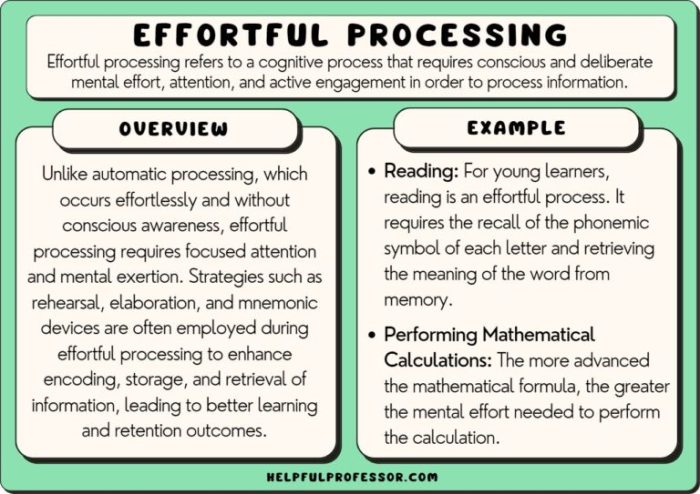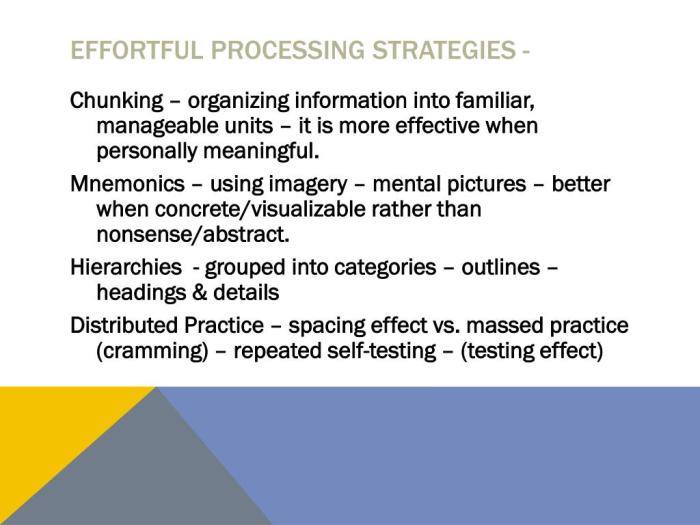Effortful processing can only occur with – Effortful processing, the intentional allocation of cognitive resources to perform complex tasks, is essential for higher-order cognitive functions. Unlike automatic processing, which occurs effortlessly and unconsciously, effortful processing requires conscious effort and attention.
Cognitive resources, such as working memory, attention, and motivation, play a crucial role in effortful processing. Limited cognitive resources can impact its effectiveness, highlighting the importance of managing these resources efficiently.
Defining Effortful Processing

Effortful processing refers to the deliberate, controlled, and conscious allocation of cognitive resources to perform cognitive tasks. It involves focused attention, strategic planning, and the active manipulation of information in working memory. Effortful processing is distinct from automatic processing, which occurs effortlessly, unconsciously, and with minimal cognitive effort.
Cognitive Resources and Effortful Processing

Effortful processing relies heavily on cognitive resources, such as attention, working memory, and executive functions. These resources are limited, and their availability can significantly impact the effectiveness of effortful processing. When cognitive resources are depleted, effortful processing becomes more challenging, leading to errors and reduced performance.
Factors Influencing Effortful Processing, Effortful processing can only occur with
Several factors can influence the effectiveness of effortful processing, including:
- Attention: Focused attention is crucial for effortful processing. Distractions and competing demands can impair attention and hinder effortful processing.
- Motivation: Intrinsic motivation enhances effortful processing by increasing engagement and persistence in cognitive tasks.
- Working Memory: Working memory capacity and efficiency play a vital role in effortful processing, as it holds and manipulates information during cognitive tasks.
Applications of Effortful Processing

Effortful processing is essential in various real-world applications, such as:
- Learning: Effortful processing is crucial for acquiring new knowledge and skills, as it involves active engagement with information and the formation of meaningful connections.
- Problem-Solving: Effortful processing enables individuals to analyze complex problems, generate solutions, and make informed decisions.
- Decision-Making: Effortful processing allows for careful consideration of options, weighing of pros and cons, and making rational choices.
Limitations of Effortful Processing: Effortful Processing Can Only Occur With

While effortful processing is essential for complex cognitive tasks, it has certain limitations:
- Capacity Limitations: Effortful processing relies on limited cognitive resources, which can become depleted with prolonged use.
- Attentional Demands: Effortful processing requires sustained attention, which can be challenging to maintain over extended periods.
- Slow and Demanding: Effortful processing is generally slower and more demanding than automatic processing, as it requires conscious effort and cognitive control.
Enhancing Effortful Processing
Several strategies can enhance the effectiveness of effortful processing:
- Mindfulness: Mindfulness techniques, such as meditation, can improve attention and focus, enhancing effortful processing capabilities.
- Metacognition: Metacognition involves reflecting on one’s own cognitive processes, which can help identify areas for improvement and optimize effortful processing.
- Deliberate Practice: Engaging in deliberate practice, where tasks are performed with focused attention and feedback, can enhance effortful processing skills.
Query Resolution
What are the key characteristics of effortful processing?
Effortful processing requires conscious effort, attention, and limited cognitive resources. It is intentional and controlled, unlike automatic processing, which occurs effortlessly and unconsciously.
How do cognitive resources impact effortful processing?
Cognitive resources, such as working memory, attention, and motivation, play a crucial role in effortful processing. Limited cognitive resources can hinder its effectiveness, emphasizing the importance of managing these resources efficiently.
What are some factors that can influence effortful processing?
Various factors can influence effortful processing, including attention, motivation, working memory, and individual differences in cognitive abilities. These factors can affect the effectiveness and efficiency of effortful processing.